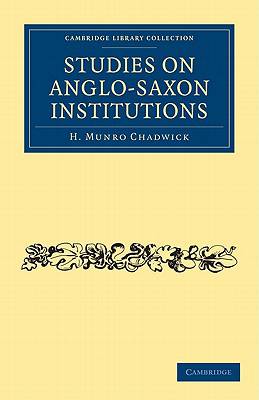
Door een staking bij bpost kan je online bestelling op dit moment iets langer onderweg zijn dan voorzien. Dringend iets nodig? Onze winkels ontvangen jou met open armen!
- Afhalen na 1 uur in een winkel met voorraad
- Gratis thuislevering in België vanaf € 30
- Ruim aanbod met 7 miljoen producten
Door een staking bij bpost kan je online bestelling op dit moment iets langer onderweg zijn dan voorzien. Dringend iets nodig? Onze winkels ontvangen jou met open armen!
- Afhalen na 1 uur in een winkel met voorraad
- Gratis thuislevering in België vanaf € 30
- Ruim aanbod met 7 miljoen producten
Zoeken
Omschrijving
First published in 1905, H. Munro Chadwick's Studies on Anglo-Saxon Institutions applied his study of philology to a re-analysis of the historical evidence for early English law and administration. In the first part he examines the development of the monetary and social systems, coming to some controversial interpretations. The second part of the book looks at the administration at national and local levels, land tenure and the origin of the nobility. He shows that there was considerable variation between different Anglo-Saxon kingdoms and their legal and social organisation. Chadwick combined his knowledge of languages, history and archaeology to highlight new areas for further research, and he had considerable influence on the development of the study of Anglo-Saxon and related subjects at Cambridge.
Specificaties
Betrokkenen
- Auteur(s):
- Uitgeverij:
Inhoud
- Aantal bladzijden:
- 442
- Taal:
- Engels
- Reeks:
Eigenschappen
- Productcode (EAN):
- 9781108010054
- Verschijningsdatum:
- 2/11/2010
- Uitvoering:
- Paperback
- Formaat:
- Trade paperback (VS)
- Afmetingen:
- 140 mm x 216 mm
- Gewicht:
- 557 g

Alleen bij Standaard Boekhandel
+ 86 punten op je klantenkaart van Standaard Boekhandel
Beoordelingen
We publiceren alleen reviews die voldoen aan de voorwaarden voor reviews. Bekijk onze voorwaarden voor reviews.











